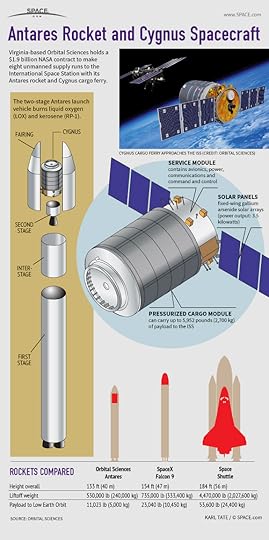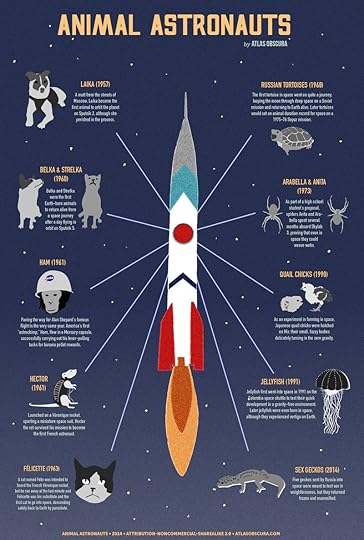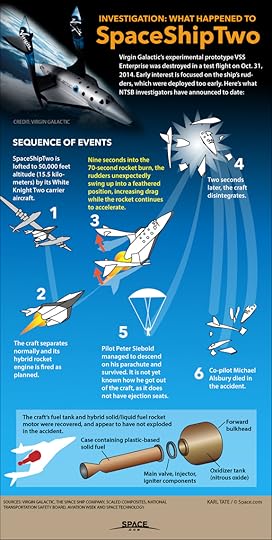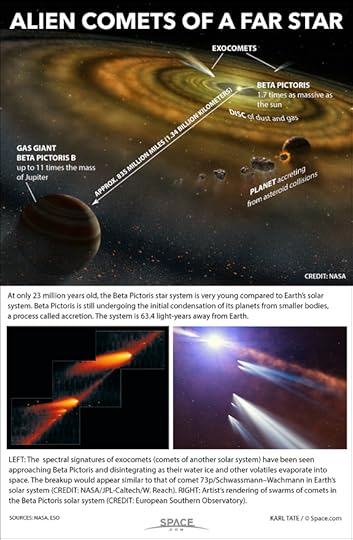R.P. Nettelhorst's Blog, page 61
November 6, 2014
Animals in Space
November 5, 2014
Blame Game
As they led Jesus away, a man named Simon, who was from Cyrene, happened to be coming in from the countryside. The soldiers seized him and put the cross on him and made him carry it behind Jesus. A large crowd trailed behind, including many grief-stricken women. But Jesus turned and said to them, “Daughters of Jerusalem, don’t weep for me, but weep for yourselves and for your children. For the days are coming when they will say, ‘Fortunate indeed are the women who are childless, the wombs that have not borne a child and the breasts that have never nursed.’ People will beg the mountains, ‘Fall on us,’ and plead with the hills, ‘Bury us.’ For if these things are done when the tree is green, what will happen when it is dry?”
Two others, both criminals, were led out to be executed with him. When they came to a place called The Skull, they nailed him to the cross. And the criminals were also crucified—one on his right and one on his left.
Jesus said, “Father, forgive them, for they don’t know what they are doing.” And the soldiers gambled for his clothes by throwing dice.
The crowd watched and the leaders scoffed. “He saved others,” they said, “let him save himself if he is really God’s Messiah, the Chosen One. (Luke 23:26–35)
As he was led to the place of crucifixion, Jesus turned to the women who were mourning and warned them about Jerusalem’s future. Jesus’ metaphor, “if these things are done when the tree is green,” pointed out that if the Romans were willing to execute an innocent man, then a guilty Jerusalem’s fate when Rome crushed its rebellion would be horrific indeed. His warning resembled those that he had already given his disciples on the same topic. The phrase about calling upon “the mountains to fall” is a quotation of Hosea 10:8, describing the Assyrian destruction of Israel.
Jesus had told his disciples to love their enemies and to pray for those who persecuted them (Matthew 5:44). Therefore, that is precisely what Jesus himself did on the cross: he prayed for his executioners and asked his Father to forgive them. Any discussion about who was to blame, or who bears the guilt for Jesus crucifixion is misplaced, since Jesus and his Father forgave them. After all, the purpose of Jesus’ death was to bring forgiveness to everyone. Jesus crucifixion makes no one guilty. Quite the contrary: his sacrifice on the cross makes possible our forgiveness and opened the way for all of us to enter the Kingdom of God.
 Send to Kindle
Send to Kindle
November 4, 2014
SpaceShipTwo Accident Investigation
November 3, 2014
Exocomets
November 2, 2014
The Will of Jesus
They took Jesus, therefore, and He went out, bearing His own cross, to the place called the Place of a Skull, which is called in Hebrew, Golgotha. There they crucified Him, and with Him two other men, one on either side, and Jesus in between. Pilate also wrote an inscription and put it on the cross. It was written, “JESUS THE NAZARENE, THE KING OF THE JEWS.” Therefore many of the Jews read this inscription, for the place where Jesus was crucified was near the city; and it was written in Hebrew, Latin and in Greek.
So the chief priests of the Jews were saying to Pilate, “Do not write, ‘The King of the Jews’; but that He said, ‘I am King of the Jews.’ ”
Pilate answered, “What I have written I have written.”
Then the soldiers, when they had crucified Jesus, took His outer garments and made four parts, a part to every soldier and also the tunic; now the tunic was seamless, woven in one piece.
So they said to one another, “Let us not tear it, but cast lots for it, to decide whose it shall be”; this was to fulfill the Scripture: “They divided My outer garments among them, and for My clothing they cast lots.” Therefore the soldiers did these things.
But standing by the cross of Jesus were His mother, and His mother’s sister, Mary the wife of Clopas, and Mary Magdalene. When Jesus then saw His mother, and the disciple whom He loved standing nearby, He said to His mother, “Woman, behold, your son!” Then He said to the disciple, “Behold, your mother!” From that hour the disciple took her into his own household. (John 19:17–27)
Women in the first century had few rights. Generally speaking, they were dependent upon their husbands, fathers, brothers or sons for their survival. If a woman became a widow and there were no male relatives to care for her, she usually had but two options: begging or prostitution. Mary was a destitute widow. Therefore, Jesus told John to treat his mother as if she were his own, and he told his mother to think of John as her son.
Although we may think that the social structure of first century Palestine was barbaric, and we might think Jesus should have spoken out more explicitly against the oppression and mistreatment of women, what he did do and say was very practical given the constraints of that society. And, of course, over the centuries since, in those parts of the world most heavily influenced by Christianity, the social structure has changed—so much so that it is now hard for us to even conceive of the problem Mary was facing.
 Send to Kindle
Send to Kindle
November 1, 2014
SpaceShipTwo
Sadly, SpaceShipTwo exploded during a test flight on Friday, October 31, 2014. There was one fatality and one serious injury. Spaceflight is hard. Spaceflightnow.com reports the following:
Virgin Galactic, part of Richard Branson’s Virgin Group, was aiming to complete qualification of the rocket-powered plane in time to begin space tourist flights to the edge of space next year.
“We’ve always known that the road to space is extremely difficult — and that every new transportation system has to deal with bad days early in their history,” Branson said in a statement. “Space is hard — but worth it. We will persevere and move forward together.”

Source SPACE.com: All about our solar system, outer space and exploration
 Send to Kindle
Send to Kindle
October 31, 2014
Near Earth Asteroid Mission
October 30, 2014
Antares

Source SPACE.com: All about our solar system, outer space and exploration
Although an Antares rocket exploded shortly after liftoff on Tuesday, October 28, 2014, there were four previous launches of the rocket that worked without any problem. Rocket science is hard and accidents are inevitable. The engineers will determine what went wrong and will make fixes to try to prevent it from happening again.
 Send to Kindle
Send to Kindle
October 29, 2014
There’s No Need for Tears
Mary stood outside the tomb weeping. As she wept, she knelt to look into the tomb and saw two angels sitting there, dressed in white, one at the head, the other at the foot of where Jesus’ body had been laid. They said to her, “Woman, why do you weep?”
“They took my Master,” she said, “and I don’t know where they put him.” After she said this, she turned away and saw Jesus standing there. But she didn’t recognize him.
Jesus spoke to her, “Woman, why do you weep? Who are you looking for?”
She, thinking that he was the gardener, said, “Mister, if you took him, tell me where you put him so I can care for him.”
Jesus said, “Mary.”
Turning to face him, she said in Hebrew, “Rabboni!” meaning “Teacher!”
Jesus said, “Don’t cling to me, for I have not yet ascended to the Father. Go to my brothers and tell them, ‘I ascend to my Father and your Father, my God and your God.’ ”
Mary Magdalene went, telling the news to the disciples: “I saw the Master!” And she told them everything he said to her. (John 20:11–18)
The angels asked Mary a question: “why do you weep?” From Mary’s perspective, it seemed obvious: Jesus was dead, someone had moved his body, and now she couldn’t even mourn properly. An already bad situation had gotten even worse.
Moments later, someone else asked her the same question, “why do you weep?” She was distraught, she had tears in her eyes. Jesus was supposed to be dead. So she didn’t recognize it was Jesus himself asking the question that time.
Jesus asked her the question for the same reason that the angels had. Of course they understood she was sad, and of course they understood why. Neither the angels nor Jesus were asking for enlightenment. They were asking to make Mary reexamine her situation. She didn’t have a reason to weep anymore. Couldn’t she see that?
When Jesus spoke her name, she suddenly could see that. Her tears probably didn’t vanish in that instant, but they certainly took on an entirely different character: they became tears of joy.
Mary realized her circumstances were radically different than what she had imagined. The storms and trials of life can buffet us so severely sometimes that we lose sight of the fullness of our own circumstances. Although our suffering is no less real, no less painful, if we can keep our eyes on Jesus, the storms of life will not buffet us quite as hard.
 Send to Kindle
Send to Kindle
October 28, 2014
Surprise, Surprise
On the first day of the week, very early in the morning, they, and certain other women with them, came to the tomb bringing the spices which they had prepared. But they found the stone rolled away from the tomb. Then they went in and did not find the body of the Lord Jesus. And it happened, as they were greatly perplexed about this, that behold, two men stood by them in shining garments. Then, as they were afraid and bowed their faces to the earth, they said to them, “Why do you seek the living among the dead? He is not here, but is risen! Remember how He spoke to you when He was still in Galilee, saying, ‘The Son of Man must be delivered into the hands of sinful men, and be crucified, and the third day rise again.’ ”
And they remembered His words. Then they returned from the tomb and told all these things to the eleven and to all the rest. It was Mary Magdalene, Joanna, Mary the mother of James, and the other women with them, who told these things to the apostles. And their words seemed to them like idle tales, and they did not believe them. But Peter arose and ran to the tomb; and stooping down, he saw the linen cloths lying by themselves; and he departed, marveling to himself at what had happened. (Luke 24:1–12)
When the women came to the tomb that Sunday morning they were very sad; it was the third day since Jesus had been crucified, and they wanted to properly prepare his body that had been buried hurriedly before the Sabbath began. Now, with the Sabbath over, they could do the job right.
The women did not suspect, did not imagine, had not conceived of even the possibility that Jesus’ body would not be in that tomb. Their primary concern was wondering exactly how they’d get into it to do the final tasks that they thought they owed him, given that the stone blocking the tomb entrance was large and heavy.
The angels that met the women at the tomb wondered why they were looking in a tomb, of all places, for Jesus. Then they quoted Jesus’ prediction of his resurrection. Even then, confronted with the reality of the empty tomb, they had trouble understanding Jesus’ words.
God often surprises us, not so much because he hasn’t told us ahead of time what to expect, but mostly because we simply didn’t understand what he told us. Thankfully, he isn’t dependent upon our understanding in order for him to act on our behalf.
 Send to Kindle
Send to Kindle







